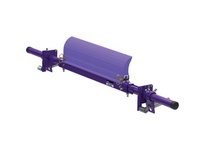What is a Belt Scraper and How Does it Work?
A conveyor belt scraper, also known as a belt cleaner, is a device used to remove material residues or debris that stick to the conveyor belt as it moves. Its purpose is to keep the belt surface clean, preventing build-up, blockages, and material spills, thereby ensuring smooth and efficient operation of the conveyor system.

For example, FLEXCO 76453 PRIMARY CLEANER FOR 60" WIDE BELT is a belt scraper.
Types of Conveyor Belt Scrapers:
-
Primary Scrapers:
- Installed at the head pulley (discharge point) of the conveyor.
- Removes the bulk of material sticking to the belt immediately after it discharges at the head pulley.
-
Secondary Scrapers:
- Located further down the belt after the primary scraper.
- Provides additional cleaning to remove finer residues left by the primary scraper.
-
V-Plow Scrapers:
- Positioned on the return side of the belt to prevent larger debris from being caught between the belt and tail pulley.
-
Rotary Brush Cleaners:
- Equipped with rotating brushes to remove sticky materials like wet clay or fine powders.
Materials Used in Scrapers:
- Polyurethane: Flexible, durable, and suited for light to medium applications.
- Tungsten carbide: Extremely wear-resistant, used for heavy-duty applications.
- Rubber: Offers high flexibility for sensitive applications.
How a Conveyor Belt Scraper Works:
- Installation: The scraper blade is mounted at an angle to make contact with the conveyor belt.
- Operation: As the belt moves, the scraper applies pressure to the surface, scraping off any remaining material. This prevents material carry-back, which occurs when some residue travels along the belt instead of being discharged.
Uses and Benefits of Conveyor Belt Scrapers:
- Reduces Carry-back: Minimizes material build-up on the belt and surrounding structure.
- Prevents Spillage: Keeps the conveyor system clean and minimizes downtime for maintenance.
- Prolongs Belt Life: Reduces abrasive wear and tear caused by trapped debris.
- Improves Efficiency: Ensures smooth movement, reducing the risk of jams or belt misalignments.
- Increases Safety: By keeping the area clean, scrapers reduce the risk of accidents caused by falling material.
Applications:
- Mining: To clean belts carrying coal, ore, or aggregates.
- Cement plants: Removes residue from cement production belts.
- Food processing: Keeps belts clean to meet hygiene standards.
- Recycling: Prevents build-up of waste materials on conveyor belts.
Conveyor belt scrapers are essential tools for ensuring efficiency, safety, and longevity in industrial conveyor systems, making them a critical part of regular maintenance.
